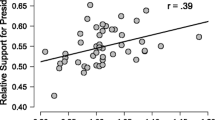Abstract
Does the Bayesian theory of confirmation put real constraints on our inductive behavior? Or is it just a framework for systematizing whatever kind of inductive behavior we prefer? Colin Howson (Hume's Problem) has recently championed the second view. I argue that he is wrong, in that the Bayesian apparatus as it is usually deployed does constrain our judgments of inductive import, but also that he is right, in that the source of Bayesianism's inductive prescriptions is not the Bayesian machinery itself, but rather what David Lewis calls the ``Principal Principle''.
Similar content being viewed by others
REFERENCES
Albert, M.: 2001, 'Bayesian Learning and Expectations Formation: Anything Goes', in D. Corfield and J. Williamson (eds), Foundations of Bayesianism, Kluwer, Dordrecht.
Carnap, R.: 1950, Logical Foundations of Probability, Chicago University Press, Chicago.
Dawid, A. P.: 1982, 'The Well-Calibrated Bayesian', Journal of the American Statistical Association 77, 604–613.
Earman, J.: 1992, Bayes or Bust?, MIT Press, Cambridge, MA.
Howson, C.: 2001, Hume's Problem: Induction and the Justification of Belief, Oxford University Press, Oxford.
Howson, C. and P. Urbach: 1993, Scientific Reasoning: The Bayesian Approach, 2nd edn., Open Court, Chicago.
Jaynes, E. T.: 1983, Papers on Probability, Statistics, and Statistical Physics,D.Reidel, Dordrecht.
Kelly, K. T.: 1996, The Logic of Reliable Inquiry, Oxford University Press, Oxford.
Keynes, J. M.: 1921, A Treatise on Probability, Macmillan, London.
Levi, I.: 1980, The Enterprise of Knowledge, MIT Press, Cambridge, MA.
Lewis, D.: 1980, 'A Subjectivist's Guide to Objective Chance', in R. C. Jeffrey (ed.), Stud-ies in Inductive Logic and Probability, Vol. 2, University of California Press, Berkeley, CA.
Lewis, D.: 1994, 'Humean Supervenience Debugged', Mind 103, 473–490.
Miller, D.: 1966, 'A Paradox of Information', British Journal for the Philosophy of Science 17, 59–61.
Strevens, M.: 1995, 'A Closer Look at the "New" Principle', British Journal for the Philosophy of Science 46, 545–561.
Strevens, M.: 1999, 'Objective Probabilities as a Guide to the World', Philosophical Studies 95, 243–275.
Rights and permissions
About this article
Cite this article
Strevens, M. Bayesian Confirmation Theory: Inductive Logic, or Mere Inductive Framework?. Synthese 141, 365–379 (2004). https://doi.org/10.1023/B:SYNT.0000044991.73791.f7
Issue Date:
DOI: https://doi.org/10.1023/B:SYNT.0000044991.73791.f7




